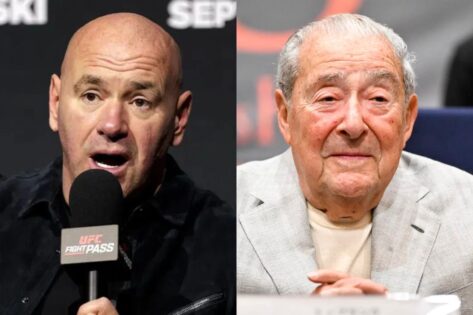Since TKO Group—the parent company of the UFC and WWE—announced its plans to launch a new boxing league, much like Zuffa Boxing, in collaboration with Saudi Arabia’s General Entertainment Authority next year, led by Dana White, speculation has been rampant. With a UFC-style model set to reshape the boxing landscape, many questioned how the promotion would navigate the constraints of the Muhammad Ali Boxing Reform Act, a Federal law, codified in 2000, which was designed to protect boxers from exploitation by promoters, enhance transparency, and prevent conflicts of interest in the sport. Well, they have the answer now.
Enter the new Muhammad Ali American Boxing Revival Act, introduced by Representatives Brian Jack (R-Ga.) and Sharice Davids (D-Kan.). This proposed legislation aims to build upon and modernize the existing Ali Act and the Professional Boxing Safety Act (PBSA). Among its key updates is the creation of alternative systems known as Unified Boxing Organizations (UBOs), which would allow promoters to establish and sanction their own titles, potentially reshaping the sport’s power dynamics. It effectively allows Dana White and the TKO Group the authority to build a rival league outside the traditional sanctioning ecosystem of the WBA, WBC, and WBO, much like the UFC. But that’s not all.
This proposed update would give promoters significantly more control over rankings, titles, and matchmaking, potentially allowing them to bypass traditional oversight from state athletic commissions. The legislation also introduces a minimum purse of $150 per round for boxers. While six U.S. states currently fall below that threshold, many others offer no minimum at all. Additionally, the bill mandates a minimum of $25,000 in health coverage for injuries sustained during fights, well above the existing requirements in 43 states.
The proposed bill has faced some criticism, with claims that it could lead to unfair matchmaking and reduced financial transparency for fighters fighting under the UBOs, like Dana White’s new boxing league. Some also suggest that creating a framework for promoter-controlled titles effectively undermines the Ali Act’s core protections of transparency and fairness. And as if that wasn’t enough, while the legislation is being introduced in Congress, American boxing has been hit with another massive blow. “The last Top Rank event of its ESPN contract airs Saturday,” veteran boxing journalist Dan Rafael shared on X.
The event will headline Xander Zayas vs. Jorge Garcia Perez for the vacant WBO super welterweight title in New York at the MSG Theater. Top Rank, led by Bob Arum, doesn’t appear to have signed with a new broadcaster, but Rafael’s worry stems from the fact that boxing won’t be available on TV for the first time since the 1940s as the last boxing promotion to have a TV deal airs its final show on July 26. “After that, there’ll be no regularly scheduled #boxing on linear TV in the U.S. for the 1st time essentially since the early 1940s when TV became widely accessible,” Rafael added in a sad update for American boxing fans.
The last Top Rank event of its ESPN contract airs Saturday. After that there’ll be no regularly scheduled #boxing on linear TV in the U.S. for the 1st time essentially since the early 1940s when TV became widely accessible. Shame on the stewards of the sport who let it happen.
— Dan Rafael (@DanRafael1) July 23, 2025
He condemned the people who allowed this to happen, noting, “Shame on the stewards of the sport who let it happen.” In the meantime, Brian Jack and Lonnie Ali have further elaborated on backing the new Muhammad Ali American Boxing Revival Act.
Brian Jack and Lonnie Ali share their take on the new legislation
Brian Jack and Lonnie Ali have both expressed strong support for the new bipartisan legislation aimed at reforming professional boxing in the United States. Also endorsed by the Association of Boxing Commissions, the bill, according to the representatives, is intended to complement the existing sanctioning body model while giving fighters greater choice, enhanced protections, and improved healthcare benefits.
Lonnie Ali, widow of Muhammad Ali, whose legacy helped shape boxing’s cultural significance, gave her blessing to the legislation. “If Muhammad [were] with us today, he would want to ensure the sport of boxing in America remained strong and viable for generations to come,” she said. “Given its enhanced protections for boxers, I believe Muhammad would be proud to have his name associated with this bill.”
Credits: IMAGO
Congressman Brian Jack emphasized that the original Ali Act remains unchanged. “We are not touching the Ali Act,” Jack explained. “We’re adding an additional section… that allows for the creation of UBOs.” Jack clarified that the intent was to resolve ambiguities in the original law that “stifled investment and discouraged innovation.” Jack and Sharice Davids aim to rally bipartisan support in Congress. “Let’s let sports guide the way to what I hope to be a return to bipartisanship,” Jack stated optimistically.
It looks like TKO Group’s new boxing venture is out to reshape the boxing landscape. While the legislation hasn’t been passed yet, if and when it does, it will give them complete control over the fighters who choose to work under the UBOs. What do you make of this?
The post American Boxing Takes Another Blow Amid Massive Changes to Ali Act appeared first on EssentiallySports.



